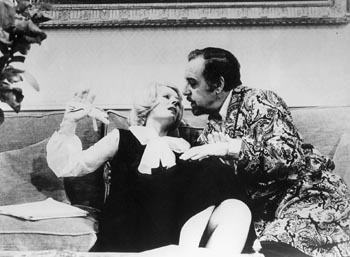![[Metroactive Movies]](/movies/gifs/movies468.gif)
[ Movies Index | Show Times | San Jose | Metroactive Central | Archives ]
 Personal Couching: Fernando Rey seduces Delphine Seyrig in 'The Discreet Charm of the Bourgeoisie.' Holiday in Miranda Buñuel's great 'The Discreet Charm of the Bourgeoisie' returns SOME LINES are invariably funny, despite any number of repetitions: "No! Not that left! The other left! Waaaagh!" "Well, at least it's not raining," "I didn't have to stuff the turkey--it wasn't empty" and so on. But perhaps the funniest of them all is "What is this? Some kind of joke?" That essence of not knowing whether or not a joke is being perpetrated applies perfectly to Luis Buñuel's classic The Discreet Charm of the Bourgeoisie. The 1972 film is being re-released in a new print with a fresh subtitles--badly needed, as the original titles are rife with misspellings and also seem to miss an idiom here and there. The film, Buñuel's 30th, co-written by Jean-Claude Carrière, offers a series of rich yet macabre sketches, like a more urbane Monty Python movie with touches of The Sixth Sense. In this comedy of interruption, some well-off Parisians are tantalized, unable to eat or have sex because of a variety of circumstances. Any interpretation of the title might do. It may be random nonsense, since Buñuel worked that way. But it could be that the title refers to the bulletproof good manners that serve a well-bred person. Neither social embarrassment, insult nor machine-gun attack can really fluster them. Early in his career, in Un Chien Andalou (1928), the angriest movie every made, Buñuel's fury was visible. Here, Buñuel delivers a sort of backhanded salute to his persecutors, having a laugh at their impotence but enjoying their elan. Of the group of six core members, two stand out. Saying this isn't meant to snub Bulle Ogier, who plays Florence, a short, wicked blonde piece with an unconcealable drinking problem. Stéphane Audran plays Alice Senechal, a great lady--with duties as well as rank--who ends up in the grip of various mortifying situations. Audran is one of chicest actresses ever to stand behind a subtitle. She's a glamorous long-legged woman with one of those snobbish yet vaguely spiritual faces that used to be hand-painted on department-store mannequins. The other prime member of the cast is the effortlessly droll comedian Fernando Rey, a snazzy Latin Nixon. He plays Don Rafael Acosta, the ambassador from the imaginary banana republic of Miranda, a Third World hellhole in revolt--and per capita the most murderous place in the world. He makes some money on the side moving contraband white powder through the diplomatic pouch and amuses himself by sleeping with Simone (Delphine Seyrig), the wife of a friend and associate. WHEN REY met Paul Mazursky on the set of Moon Over Parador, he told his newest director, "Treat me like the low actor that I am." Rey, like Gene Hackman, has a knack for the gusto of doglike men. Don Rafael fancies himself a great lover (referred to later, when, in a dream sequence the cast is imagined performing Don Juan on stage without benefit of script or rehearsal). Waiting for a lady, Rey is seen in a paisley smoking jacket spraying his tonsils with an atomizer, but we also glimpse him hiding under a table, on all fours with a piece of stolen meat in his plump jaws. The end of the film turns macabre, as vengeful ghosts enter the picture, and we take a detour into the land of the dead--a spine-chilling conception, this dusky city with bells constantly tolling and a distant hubbub of overheard conversation. Here, for a change, is a dream sequence that looks like a real dream, all sad and unresolved like a real dream. In these morbid moments, The Discreet Charm of the Bourgeoisie shows us more than just an interlocking series of jokes. Underneath the antics of these dissatisfied members of the master class lie constant reminders of the fate they're trying to keep away. Buñuel knew that he was awaiting the same fate, and he sympathizes with the human appetites of this gang. The Discreet Charm of the Bourgeoisie tells a humane joke, yes, but an unsettling one. Best of all, we never can tell where the film is going to go, or how far--as in the "Night of the Bloody Sergeant" episode, where Buñuel plays a political torture scene for laughs (and does so very well). Buñuel's movie shoots sacred cows the Farrelly brothers of Me, Myself & Irene wouldn't dare discomfit: cherished conceptions of story arcs, the three-act structure and the importance of keeping the characters high-minded and sympathetic. Realizing that he can't beat the bourgeoisie or join them, Buñuel watches them marching off in their own little parade, an image that repeats and concludes this berserk masterpiece.
The Discreet Charm of the Bourgeoisie (PG; 105 min.), directed by Luis Buñuel, written by Buñuel and Jean-Claude Carrière, photographed by Edmund Richard and starring Fernando Rey, Delphine Seyrig and Stéphane Audran, opens Friday at the Towne Theater in San Jose. [ San Jose | Metroactive Central | Archives ]
|
From the June 29-July 5, 2000 issue of Metro, Silicon Valley's Weekly Newspaper.
Copyright © 2000 Metro Publishing Inc. Metroactive is affiliated with the Boulevards Network.
For more information about the San Jose/Silicon Valley area, visit sanjose.com.